By Léa Charette
Highlight of Article:
The following is a covering of the English Diner event that was held at NCCU iHouse on March 5th. Following the event, I conducted an interview with a Taiwanese student and an international degree student. I enquired as to their perspective on both learning English and navigating life in Taiwan and abroad.
The chatter of voices is what draws you in. On the ground floor of NCCU's iHouse, this year's first edition of English Diner is pretty hard to miss. As you peer from the doorway to see what is going on, you can see both local and international students grouped together around tables, deep in conversation. On this lovely sunny day, NCCU - and Taiwan as a whole - through this event feel connected to the world in a warm, friendly atmosphere.
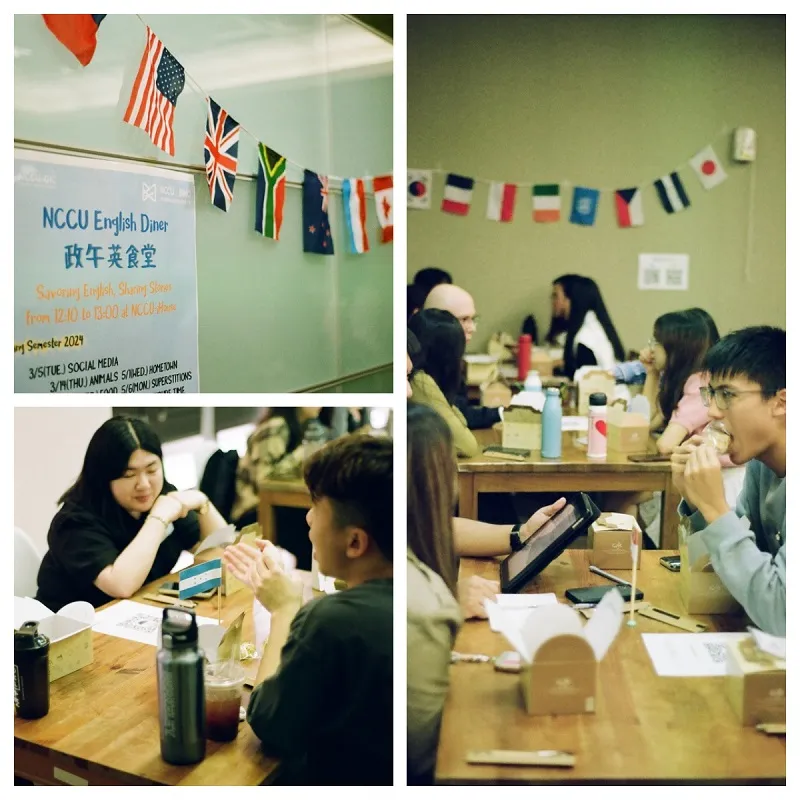
▲Welcome to English Diner! Strung on the walls, a colorful banner emphasizes the international component of the event. On each table is a little flag representing the visiting students' nationality/Photo Credit: Léa Charette.
As the event drew to a close, I met with the lovely Miguel and Kelly, who are both business majors at NCCU. Miguel - you might know him from student orientation - is a fourth-year international degree student from Honduras. He says that he likes the world and sees himself as moving from one place to another. Kelly is Taiwanese and also a senior. She studies International Business, which is her pathway to achieving her dreams. Jason, a Taiwanese fourth year journalism major, also attended the interview. I felt privileged that he considered our informal meeting to be a learning experience.
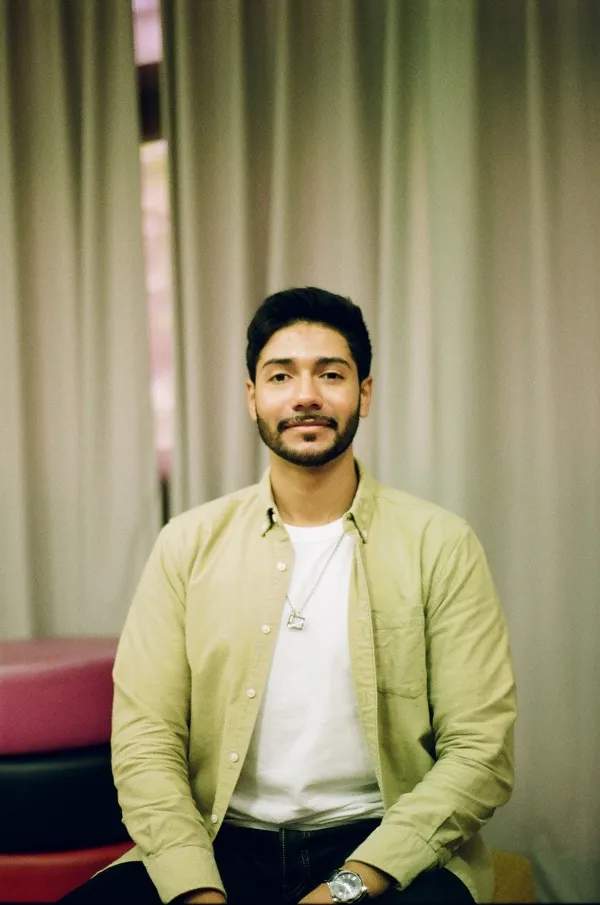
▲Miguel’s portrait/Photo Credit: Léa Charette.

▲Kelly’s portrait/Photo Credit: Léa Charette.
As I collected their impressions on attending the first English Diner, Kelly pointed out the “lively atmosphere and nice, friendly people”. As an extrovert, she felt energized by getting to know people from different countries. In turn, Miguel mentioned that he now felt connected to the people he talked to “on so many levels”. His discussion with his peers centered on their cultural differences and the places they had visited. As for Kelly, she declared it was critical for her to “broaden [her] horizons and respect different cultures”. This interconnectedness and emphasis on cultural difference allowed me to center my interview on the link between Taïwan and the world.
As an aside, Miguel said that he felt “relieved” to see his fellow students willing to learn English as an international language. Coincidentally, I wanted to use English as a starting point for our discussion.
1. Miguel, you mentioned that learning English was a life-changing event for you. Could you expand on that?
M: I started learning English as a little kid, so I do not remember how it all started. However, I do remember doing speech competitions in middle and high school, which led to me joining the debate team and participating in Model UN (United Nations). I started hosting English-speaking activities at school. Through it all, I grew to consider myself a bilingual person. Having what I felt were two mother tongues led me to develop a variety of useful skills regarding communication or relating to people in general, so much so that I eventually ended up studying abroad.
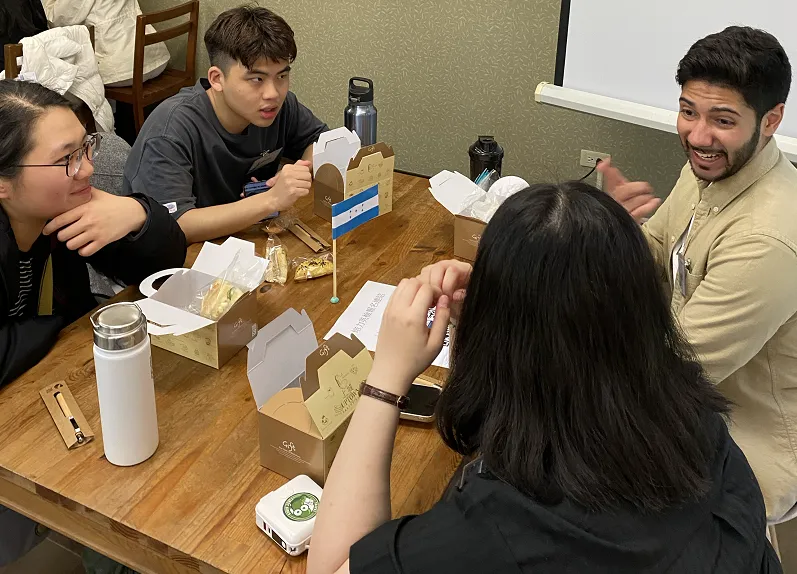
▲Miguel and his team member at English Dinner
Chinese is my third language. Coming here and adopting the language - just as I had previously adopted English -, I simultaneously adopted a culture. Being immersed in different cultures and thus gaining new perspectives is what is life-changing to me. You get to relate to different people. Furthermore, instead of feeling like you belong in one place, you realize that you belong in many. It gives you this flexibility of lifestyle that is truly unrivaled.
2. Kelly, Miguel touched upon the many skills he found useful after strengthening his English speaking. As for you, what skills besides English do you consider to be useful in navigating the job market or everyday life?
K: I would say communication skills, or more generally presentation [public speaking] skills. When I was doing my student exchange in Austria, I realized that most Taïwanese students are hesitant or shy to speak, especially in English. However, in class the teacher would ask us to speak English more often to practice. He told us: “you do not need to think too much about the grammar, just speak out”. I think I learned a lot from this experience.
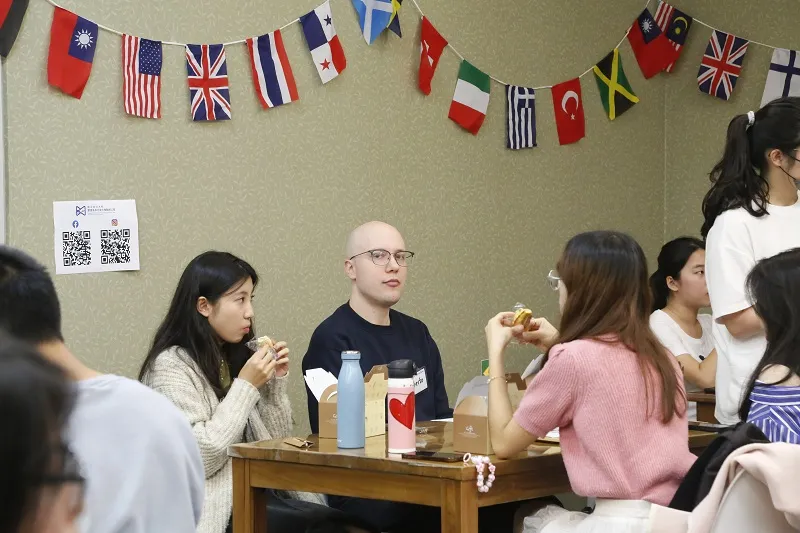
▲Kelly and her team members having a good time during the event
3. Miguel, is there something you want to add?
M: Well, I think that leadership is very related intuitively to language learning, simply because in both circumstances you must be empathetic towards people. Learning languages forces you to learn those differences in point of view, which subsequently enhances your communication, organization and writing skills. For example, as I am studying Chinese, I learn that there are different grammatical structures, vocabularies or even ways of thinking about life that I would not have considered if I had stopped at Spanish and English. I find that learning Chinese improves my other languages. Interesting, isn't it?
4. To keep to the academic/learning subject, I want to ask both of you: is what you are currently studying what you plan on doing in the future, or do you have other dreams?
K: I want to do business. That is the focus of my studies and my life. Not only that, I want to be the boss in ten years' time. In twenty years, I plan on becoming the president. During the next ten years, to achieve that goal, I want to study abroad. I found Canada to be the best option for me. As I want to study marketing, I was hesitating between Canada or the United States, because both have interesting programs. After consulting with my friends, I got the impression that the US was rather dangerous. Since Canada is also an English-speaking country, it sounds like a better option.
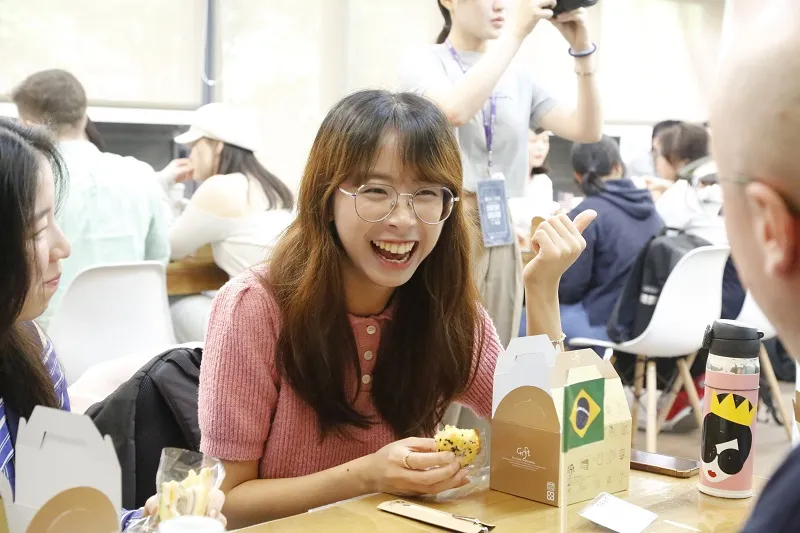
▲Kelly had a great time during English Dinner
5. Kelly, I am very curious as to your motivation and dedication in regards to your future goals. Do you remember when you decided on this path for yourself?
K: I think it was during the duration of my exchange. While abroad, I had more free time to think about myself and what I wanted out of life. At NCCU, I was always too busy with classes, clubs, and internships, just like other Taiwanese students. I wanted to keep up with everyone, but I would sometimes feel increasingly pressured. In Austria, I finally had the time to pause and ask myself: “who do I want to be in the future?”. I realized that what I wanted was to be the leader.
6. What about you, Miguel? Is business what you plan on doing for a good portion of your life, or do you have other dreams you might want to pursue?
M: When I was younger, I was a very creative and musically-driven person. I practiced the piano a lot and created my own compositions. I continued for around eight years, but because I was self-taught the music teachers around me were kind of looking down on my stuff and did not believe in it. When high school came around, I decided to choose the more “practical” route. I went on to study business, which in retrospect was a better calling for me than music. I had always fallen into the organizational leading position in anything I did, let it be debates, conferences or group projects. It all made so much sense.
Here at NCCU, I realized that although I do not mind taking the lead, I am a more analytical person at heart. I thus decided to study the more analytical side of business in Business Intelligence (BI). My minor was in Data Analytics. I want to go into that field and hopefully become a consultant or integrate management in either Business Intelligence or Finance.
7. While Kelly plans on going to Canada, where do you see yourself settling in in the future?
M: Before coming to Taïwan, I was very hesitant about moving to the other side of the world. Now that I am here, I find that I am very comfortable where I currently am. I would love to start my career in Taïwan, but that requires language skills that I currently do not quite possess. I am thinking about spending the next one to two years working here and then doing my masters abroad. The United Kingdom has many interesting MBAs (Masters in Business Administration). Eventually, if I become fluent in Chinese, I would like to stay in Taïwan. If not, I can always go to Spain, as that is where my father’s family is from.
--------
This interview presents two testimonies that allow the readers to see Taïwan through global lens without broaching the island’s complex international status. While attending events such as the English Diner, one can feel a sense of human interconnectedness that is increasingly valuable in intercultural conversations. In regards to the interviewee’s answers, all transcription errors are mine alone.
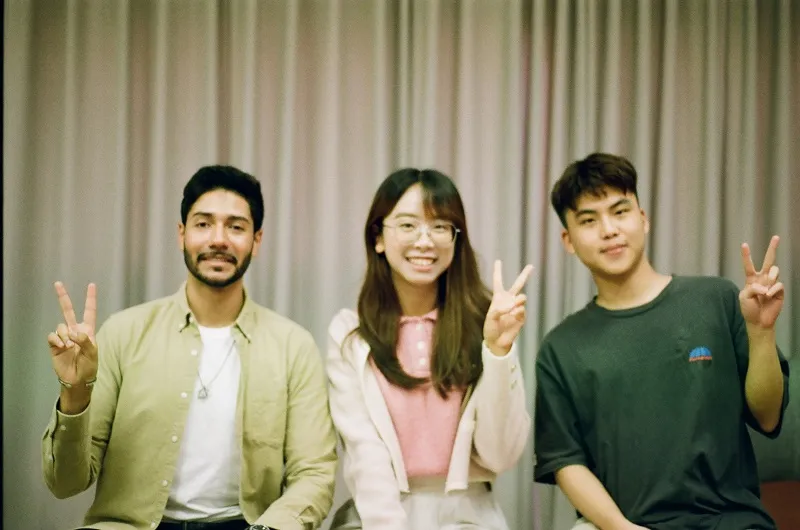
▲Group picture of the interview attendees, from left to right: Miguel, Kelly, and Jason/Photo Credit: Léa Charette.
More on OIC connect no.94:
Tsou aboriginal group, a closer look
Wang Gong Pastoral Patrolling of the Fields: a Look Into Local Religion in Muzha
Hearing from members of the NCCU Host Family Program
Warming Board game night at I-House hosted by IA NCCU
From Campus to Career: Navigating Futures at NCCU's Career Fair
From Campus to Career: Exploring the Working Market in Taiwan for International Students